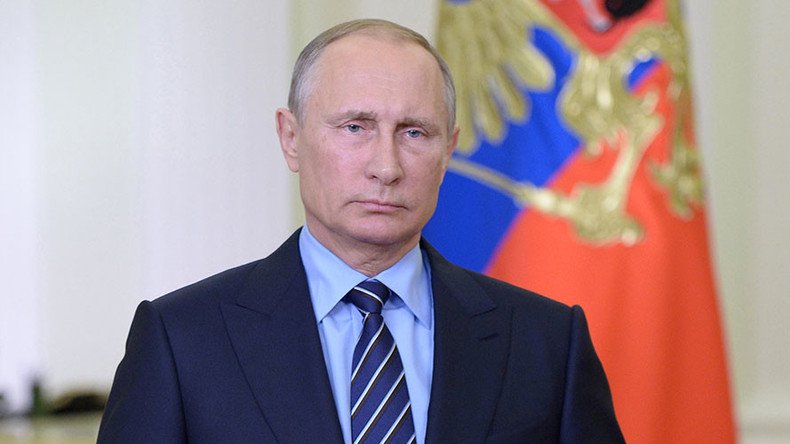Neither Clinton nor Trump likely Putin preferences for White House

Journalists, columnists, academics, pundits, politicians, your average man on the street — they all have one thing in common: They all think they know what Vladimir Putin wants.
The exact phrase “what Putin wants” has shown up on Google more than 22,000 times. At the same time, the question “what does Putin want?” has shown up more than 9,000 times — so it seems the few who don’t already think they know, would really like to find out.
Pointing the finger at Moscow and making baseless claims about ‘what Putin wants’ to win political points has become an entirely predictable strategy — but it’s a popular strategy because it’s a remarkably simple and convenient one. No substance required, just good old-fashioned fear-mongering.
In the US, efforts to link Russia to domestic politics have ranged from the absurd to the outright comical. Cast once again as the Evil Empire, Russia has become one of the most persistent themes in what is playing out as perhaps the biggest presidential election train wreck in history.
Putin on the Manhattan bridge... pic.twitter.com/MOAmMjPXZH
— Gissur Simonarson (@GissiSim) October 6, 2016
For Hillary Clinton, no one has been a more convenient scapegoat and bogeyman than the Russian president, as evidenced by her ongoing strategy of attempting to bury the content of various unflattering leaks by insisting that anything that reflects negatively on her is simply part of a Kremlin plot to discredit her and help Donald Trump to victory.
That idea — that Putin wants Trump to win — has been one of the most enduring tropes of the election. Interestingly, the claim stems from complimentary comments that Trump himself made about Putin — not the other way around. In fact, Putin has said next to nothing about Trump. On one occasion he called him a “colorful” character — and the Putin-Trump “bromance” propaganda juggernaut took off from there.
What’s ‘good for’ the Kremlin?
So, since everyone else is at it, I’m going to thrown in my two cents: In an ideal world, Putin probably wouldn’t want either one of these train wreck candidates to win the presidency — and why would he?
Contrary to popular belief, neither one has said anything that would indicate in sincere terms that they understand just how much work it would take to genuinely improve relations between the two countries. It’s not just a matter of “Wouldn’t it be nice if we got along with Russia?” — there needs to be a serious acknowledgement of the dangers facing the world if we drift further and further into a second and more perilous Cold War.
Clinton has made clear she has no interest in improving relations with Moscow. She has repeatedly called Putin a dictator and even compared him to Hitler. Her foreign policy will be entirely at odds with the Kremlin’s from the get-go — and she is likely to be far more aggressive about it than Barack Obama has been. During the most recent presidential debate, she reconfirmed her commitment to implementing a no-fly zone in Syria — a move which could lead to a shooting war between two nuclear powers over an already ravaged and devastated nation.
Trump, on the other hand, appears to be ego-driven and delusional about the immense sway he believes he would have with the Russian leader. To give one particularly apt example, last year Trump argued that Putin would give up “traitor” Edward Snowden and send him back to the US at the click of his fingers: “If I’m president, Putin says hey, boom, you’re gone! I guarantee you that,” he said.
Trump has also walked back his own compliments of Putin and flip-flopped all over the place on Syria. One minute he’s accusing Russia of single-handedly causing the collapse of a recent short-lived ceasefire and complaining that Putin has no respect for the US, and the next he’s cheering on Russia’s actions in Syria, saying that he’d like to join in. Meanwhile, his vice presidential pick Mike Pence stepped out last week to advocate for a Syria policy almost identical to Clinton’s, while insulting Putin as a “small and bullying” leader. Trump has since said he disagrees with Pence on Syria, but it sent more mixed messages nonetheless.
In the past, Trump has also called for sanctions on Russia over the crisis in Ukraine and called for a more forceful US intervention in that country, before again changing his mind and questioning why the US has any business meddling in Ukraine at all, calling any debate over Crimea’s rejoining Russia “Europe’s problem”.
The devil you know or the devil you don’t?
But the Kremlin and its operatives are not stupid. They are well aware that what Trump says on Monday might be entirely at odds with what he says on Tuesday or Wednesday. Putin is unlikely to savor the thought of someone like that controlling US foreign policy. Indeed, there are some who believe Putin would rather deal with Clinton simply because she is the known entity and her policies will be so predictable. Anti-Russia, yes, but not an unpredictable departure from what Moscow has come to expect. Those people would argue that the devil you know is better than the devil you don’t.
'Fighting #ISIS together with Russia would be great' https://t.co/Zg8T4UxFLMpic.twitter.com/f19k87kx82
— RT America (@RT_America) October 10, 2016
Then there are matters of personality. Usually it’s best to steer away from amateur psychoanalysis in these matters, but then, most leaders don’t display all the facets of their personality quite as freely as Donald Trump does. Trump, we have heard recently, doesn’t like to be “upstaged” by anyone.
He was reportedly furious that his running mate had performed better in his own debate than Trump himself had. He has also shown himself to be incredibly sensitive to any perceived slights against him. To him, the idea that someone might be laughing at him or getting one over on him is infuriating. It would probably be fair to say that these traits could be rooted in deep insecurity and that this carries over into how he talks about America’s place in the world. He is obsessed by the idea that the US has become “weak” under Obama and needs to reassert itself as a strong power. To that end he has also commented that the relationship he wishes to have with Putin would be one where “we [the US] have the strength” — not Putin and Russia.
A massive amount of attention is paid to Trump’s practically non-existent relationship with Putin. The media have run with and exaggerated any of his comments that can be perceived as pro-Russia,while ignoring the rest. There now exists a broad assumption in American media that Trump and Putin would get along like a house on fire and the world would crumble under the weight of their combined evil.
Little attention is paid to the things Trump has said — and the ways in which he has flip-flopped — that indicate it may not all be sunshine and roses. For its part, the Kremlin has complained that it is sick of being dragged into US domestic politics by both candidates and used to score points.
As for Putin? He has said he’d like to work with a person who can make responsible decisions and implement agreements: “Their last name doesn’t matter.”
Jill Stein, anyone?
The statements, views and opinions expressed in this column are solely those of the author and do not necessarily represent those of RT.













